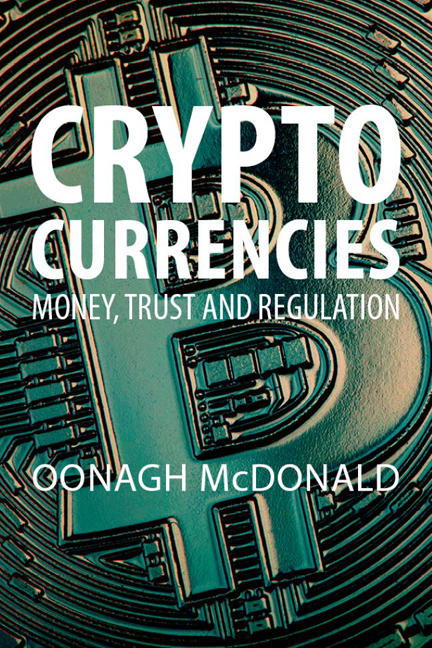Book contents
- Frontmatter
- Contents
- Preface
- Acronyms
- 1 Introduction: Bitcoin beginnings
- 2 New cryptocurrencies and new developments
- 3 Stablecoins: the search for stability
- 4 Initial coin offerings: the “Wild West”
- 5 The regulatory response to ICOs
- 6 Global stablecoins: Libra
- 7 Reactions to stablecoins
- 8 Central banks and central bank digital currencies
- 9 The decline of cash
- 10 Credit and trust
- 11 Epilogue: the crypto winter
- Appendix: smart contracts
- Notes
- Index
Appendix: smart contracts
Published online by Cambridge University Press: 22 December 2023
- Frontmatter
- Contents
- Preface
- Acronyms
- 1 Introduction: Bitcoin beginnings
- 2 New cryptocurrencies and new developments
- 3 Stablecoins: the search for stability
- 4 Initial coin offerings: the “Wild West”
- 5 The regulatory response to ICOs
- 6 Global stablecoins: Libra
- 7 Reactions to stablecoins
- 8 Central banks and central bank digital currencies
- 9 The decline of cash
- 10 Credit and trust
- 11 Epilogue: the crypto winter
- Appendix: smart contracts
- Notes
- Index
Summary
In simple terms a smart contract is a self-executing contract with the terms of the contract between the buyer and the seller being directly written in lines of code. The code and the implied agreements run on a blockchain platform and cannot be changed. These contracts were first proposed by Nick Szabo in two articles in 1996 and 1997. In his first article, he stated that “new institutions and new ways to formalize the relationships that make up these institutions, are now made possible by the digital revolution … I call these new contracts ‘smart’ because they are more functional than their inanimate paper-based ancestors. No use of artificial intelligence is implied. A smart contract is a set of promises, specified in digital form, including the protocols within which the parties perform on those promises.” The contract itself is a software programme written in one of the new languages, such as Solidity. The code itself can be either the sole expression of an agreement between two parties or it might be in addition to a traditional written contract, implementing certain elements.
In his second article, Szabo described smart contracts as combining protocols with user interfaces to formalize and secure relationships over computer networks. The objectives and principles for the design of these systems would be derived from legal principles, economic theory and theories of reliable and secure protocols. He claimed that by using cryptographics and other security measures, it would be possible to secure many algorithmically specifiable relationships from breaches by principals, eaves dropping or malicious interference by third parties. This would reduce the “mental and computational transaction costs imposed by the principals, third parties or their tools”. His comments about the use of the word, “smart” together with the rejection of artificial intelligence is important, since it makes it clear that they are only “smarter” than traditional paper-based contracts because they can automatically execute certain preprogrammed steps. Smart contracts at present are fairly basic, because they have to be absolutely specific – if x, then y – and unalterable. Szabo's typical analogy of a smart contract is a vending machine. Once the buyer has fulfilled the terms of the “contract” and put the coins into the machine, then the machine automatically fulfils the terms of the unwritten agreement and delivers the bar of chocolate.
- Type
- Chapter
- Information
- CryptocurrenciesMoney, Trust and Regulation, pp. 225 - 228Publisher: Agenda PublishingPrint publication year: 2023



